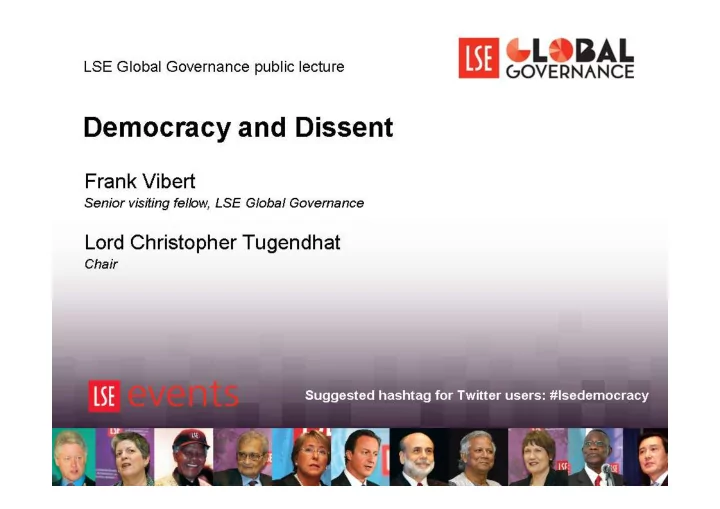

DEMOCRACY AND DISSENT THE CHALLENGE OF INTERNATIONAL RULE MAKING Frank Vibert
NORMATIVE ASSUMPTIONS • INTERNATIONAL RULE MAKING A ‘GOOD THING’. • WE WILL NEED MORE OF IT IN FUTURE.
THE TWO BASIC PROBLEMS • INTERNATIONAL RULE MAKING NOT DEMOCRATIC; • INTERNATIONAL RULE MAKING PRONE TO FAILURE
WHAT IS NEW IN ANALYSIS • CITIZENS AS RECEIVERS OF RULES MADE BY OTHERS. • FOCUS ON FAILINGS OF EXPERT GROUPS. • USE OF TWO FRAMEWORKS: – MULTI LEVEL GOVERNANCE (FORM OF AUTHORITY) – DIFFUSION FRAMEWORK.(PROCESSES OF DIFFERENT ACTORS – EXPERTS, GOVTS,CITIZENS – AT DIFFERENT STAGES OF RULE MAKING).
DIAGNOSING THE DEMOCRATIC DEFICIT • CONCILIATION? • CONGRUENCE? – INSTITUTIONAL – VALUE. • DISSENT?
HARNESSING DISSENT • TRANSFORMATION – SOCIALISATION & COMPETITIVE POLITICS – RESPONSIVENESS & POWER SHARING. • MEDIATION – LEGAL PLURALISM – COSMOPOLITANISM? • SPECIFIC GOVERNING RULES
DIAGNOSING SOURCES OF FAILURE • EXECUTIVE. – Poor leadership; mistakes by govts. • CULTURAL/ORGANIZATIONAL. – Group think; negotiated compliance. • COGNITIVE. – Failures of method in interpreting data, causalities, missing information and uncertainties.
Epistemic weakness • ‘The IMF’s ability to correctly identify the mounting risks was hindered by a high degree of groupthink, intellectual capture, a general mindset that a major crisis in large advanced economies was unlikely, and inadequate analytic approaches’. • IEO/IMF Jan 10 2011.
EXPERT GROUPS & COGNITIVE FAILURE Shared Principled Beliefs Common Notions of Validity Framing Categorisation Anchoring Herding Shared Causal Beliefs Common Problem Solving Venture Attribution Action induced Confirmatory Availability
COMBATTING COGNITIVE FAILURE: PRINCIPLES • ‘RAISING THE STAKES’ ; putting reputation & status on the line. • COMPETING PROBLEM DEFINITIONS. • CONTINUOUS CHALLENGE –from inception though evaluation.
COMBATTING COGNITIVE FAILURE: PRACTICES • COMPETIVE EVALUATION. • PROCESS TRACING • QUANTIFYING UNCERTAINTIES • CAUSAL EVALUATION
PROCEDURES AND EXPERT FAILURE Elite Characteristic Challenge Method Target of Challenge Shared principled beliefs Competitive evaluation Framing/anchoring bias Shared notions of validity Confidence levels Herding/categorisation bias Shared causal beliefs Process tracing Attribution/confirmation bias Common problem solving Continuing audit of Action induced/availability bias venture causalities
INSTITUTIONAL FIXES? • G 20 ? • Hybrids ? (combining expert groups with universal membership orgs. IPCC/UNEP/WMO). • UN? Revive Economic & Social Council? • No. Institutional arrangements will remain fluid. • Need to focus on processes –challenge processes. • Challenge process for governments?
Effectiveness & democracy • A conflict ??? – Dahl etc. • Not necessarily: common link is the need for procedures that permit challenge • To governments • To expert groups • More effective rule making • More democratic.
Recommend
More recommend